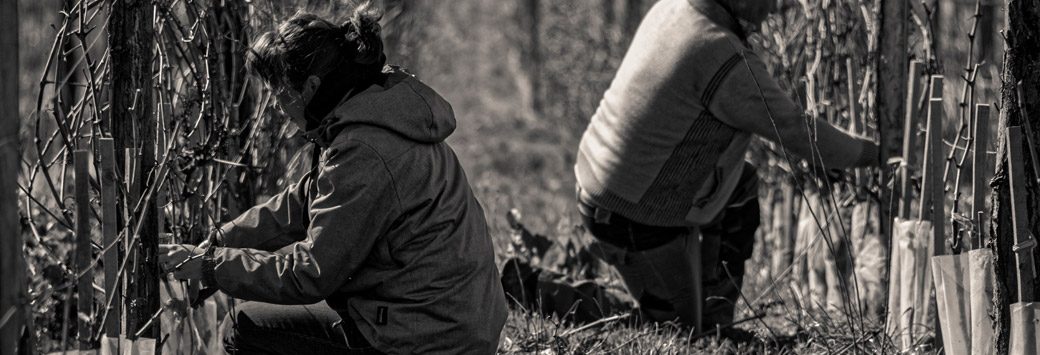
The winemakers of Madiran and Pacherenc du Vic-Bilh bubbling with ideas and projects, are constantly thinking about innovating and reinventing themselves.
The Madiran winemakers have the distinctive characteristic in that they move forward collectively, these are passionate and committed men and women able to question, innovate and surpass themselves
Tilling the soil
Most of the winegrowers in our appellations leave every other row to grass and work the other with different tools. This method makes it possible to bring better balance to the vine: the row that is worked (ploughed) will have less competition vis-a-vis the vine than the row that is grassed.
The ploughed row will be used in certain cases as a way to sow green fertilisers (faba beans, oats, clover, vetch, etc…) the following autumn.
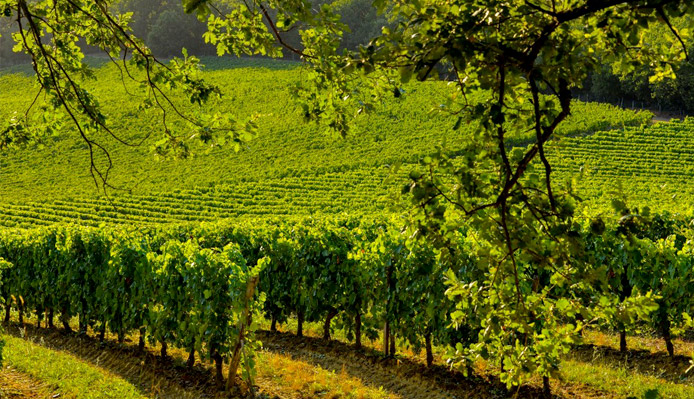
These green fertilisers allow a natural soil tillage, they boost the microbiological activity of the soil and contribute natural trace elements such as nitrogen (the main element for the growth of the vine).
In organic viticulture, chemical weeding is forbidden, so the winegrowers do their weeding mechanically under the row to remover the grass. This is a trend that has also started to interest the conventional winegrowers who, also very concerned about protecting the environment, are investing in this approach.
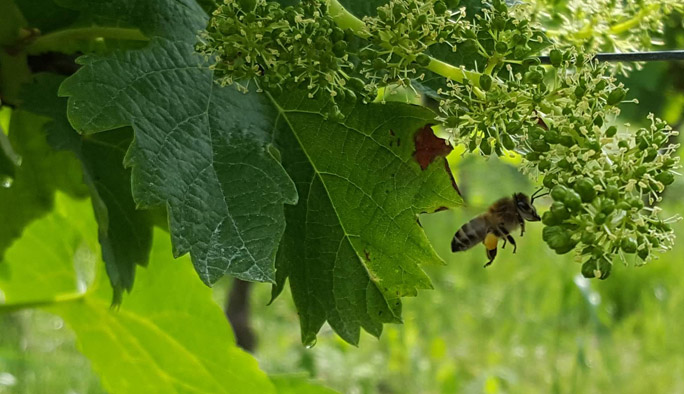
Observing the vine
The technicians for our appellations have put into place a surveillance network for the following insects: green leafhopper, leafhopper of the golden flavescence and the grape vine moth (Eudemis), in order to monitor their population and intervene at the right time.
The surveillance is based on daily monitoring of the traps set in the vineyards and field observations. The pooling of this work allows our winegrowers to reduce their inputs. It is the same for the monitoring of vine diseases: setting up untreated controls to monitor diseases (mildew, oïdium, botrytis, etc.).
The work in the cellars
In recent years, the winemakers have been trying to rethink their products in order to adapt to changing consumer expectations. This manifests itself in the heart of the Madiran range by more gentle extractions, shorter vatting time, to obtain more fruity and less tannic wines. As far as Pacherenc du Vic-Bilh is concerned, the appellation historically produces a larger share of sweet wines. However, the current trend gives prominence to dry white wines, so our winemakers are taking the opportunity to change their production.
Committed winegrowers
Since 2008 in the Madiran vineyards as in many others in France, with concerns for the methods of production and transformation that respects the environment, animal welfare and biodiversity, we are seeing more and more of our winegrowers committed to an organic farming approach under the AB label (Agriculture Biologique). Today we have 7 independent winegrowers and 4 cooperative wingrowers. Our winemakers committed to an organic approach: Domaine Damiens, Domaine Capmartin, Domaine du Moulié (in part), Domaine Labranche-Laffont, Clos Basté (Chantal and Philippe Mur were among the first to commit to organic farming in Madiran), Clos les Mets d'Âmes (also biodynamic), Domaine Pichard, Cave de Crouseilles (4 winegrowers are in the process of converting).
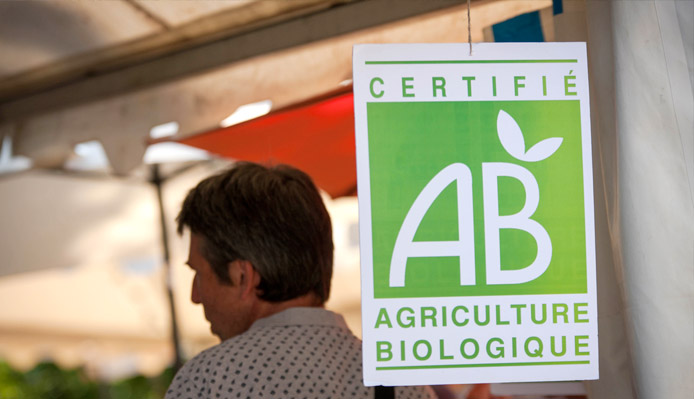
Partnerships with other appellations
It all started on 18th May 2017 during a convention with INRA (National Institute for Agronomic Research), the IFV (French Institute of the Vine) and our Southwest wines Interprofession (IVSO) to organise and coordinate the deployment of resistant grape varieties in the Southwest vineyards and allow a fine observation of the behavior of varieties mainly from French production.
The goal was to create resistant grape varieties adapted to our particular soil and weather conditions, to their management and the product profiles of our vineyard to meet several challenges:
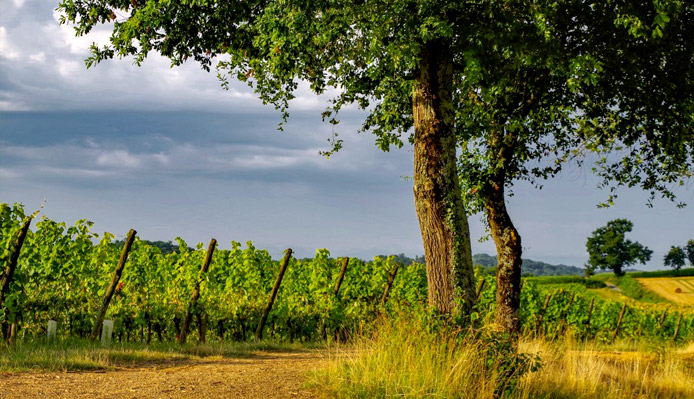
- health challenge: preserve the health of all whether it be the vine workers, inhabitants or the tourists.
- environment challenge: preservation of the fauna, flora, quality of water and the soil
- technical challenge
- quality challenge: grape varieties best adapted to climate change and new consumer tastes.
- business challenge
Responsible viticulture
Work towards a responsible sustainable viticulture, that preserves the particular character and quality of the flagship products of the vineyard. This project is underway in many different French wine growing regions and concrete creation of the resistant varieties with regional characteristics should see the light of day by 2030.
Territorial development
The distinctive characteristics of the Madiran et Pacherenc du Vic-Bilh appellations is that it is shared between two regions (Nouvelle-Aquitaine and Occitanie), three departments (Pyrénées-Atlantiques, Hautes-Pyrénées and Gers), and four inter-municipalities (CC North-East Béarn and Luys de Béarn for the Pyrénées-Atlantiques, the Community of Communes Adour Madiran for the Hautes-Pyrénées and that of Armagnac Adour for the Gers).
Building the future of this territory, of which the vine and the winegrowers are the major economical and cultural players, requires the cooperation of all.
Thus, in partnership with all of the operators, the Madiran Maison des Vins has embarked on the implementation of a territorial development project that aims to respond to the challenges facing this territory and the men and women that live in it and give it life.
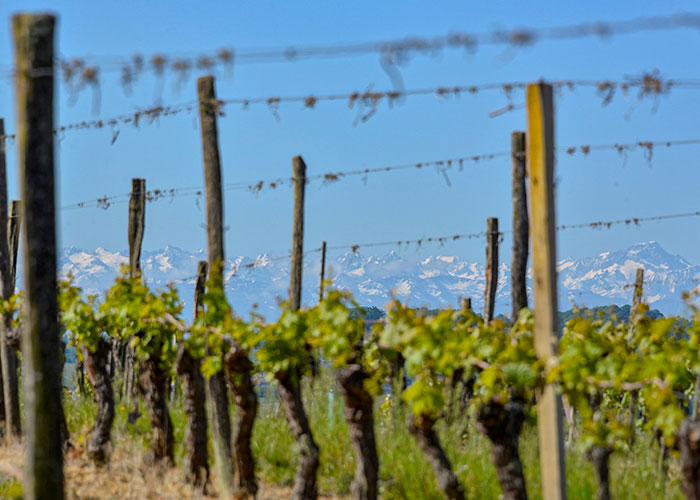
Introduce and offer a unique experience to the greatest number, attract a new generation of men and women that will make up the future of our territory and our appellations, continue to work on the quality of our wines by strengthening our environmental commitments, as many challenge as a territorial project of development will aim to overcome.